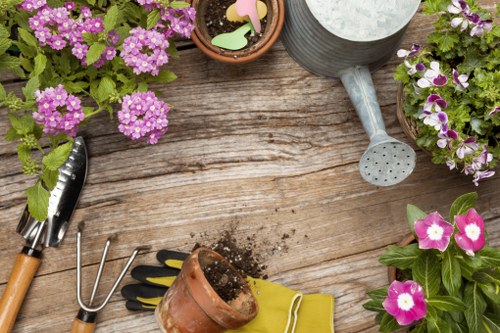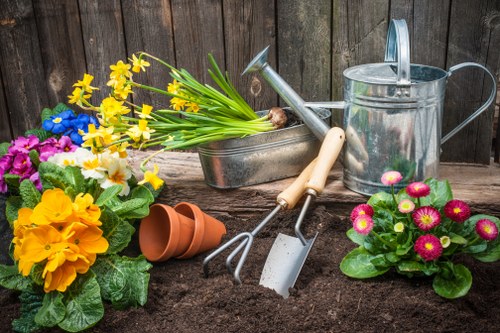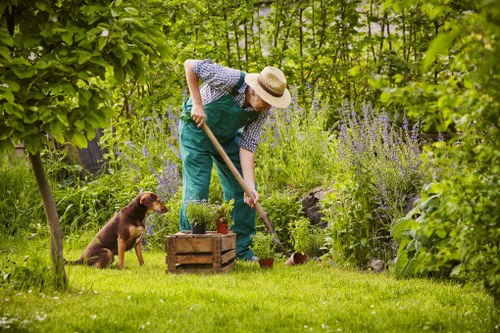Comprehensive Guide to Garden Maintenance in Finchley

Introduction to Garden Maintenance
Maintaining a beautiful garden in Finchley requires regular care and attention. Whether you’re a seasoned gardener or a beginner, understanding the essentials of garden upkeep can help your outdoor space thrive all year round. From seasonal planting to pest control, effective garden maintenance ensures your plants remain healthy and your garden remains an inviting sanctuary.
Finchley’s climate offers unique opportunities and challenges for gardeners. The temperate conditions support a variety of plants, but also demand specific care routines to manage weather fluctuations and local pests. By following a structured maintenance plan, you can achieve a lush and vibrant garden that enhances the beauty of your home.
Regular maintenance not only improves the aesthetics of your garden but also promotes sustainability. Properly maintained gardens contribute to biodiversity, support local wildlife, and can even reduce your home's carbon footprint. Investing time and resources into garden maintenance in Finchley pays off in both personal satisfaction and environmental benefits.

Essential Garden Maintenance Tasks
1. Pruning and Trimming
Regular pruning is crucial for the health and appearance of your garden plants. By removing dead or overgrown branches, you encourage new growth and prevent diseases. In Finchley, where winters can be harsh, timely pruning helps plants withstand the cold months and promotes vigorous growth in spring.
Trimming hedges and shrubs not only shapes them beautifully but also allows light to penetrate, ensuring all parts of the plant receive adequate sunlight. This fosters a more balanced and healthy growth pattern, enhancing the overall structure of your garden.
When pruning, always use clean, sharp tools to make precise cuts. This minimizes damage to the plants and reduces the risk of infection. Consider consulting a local gardening expert to learn the best pruning techniques for specific plant varieties common in Finchley.
2. Weeding
Weeds compete with your garden plants for nutrients, water, and sunlight. Regular weeding is essential to maintain the health and productivity of your garden. In Finchley, where the soil can retain moisture easily, weeds can proliferate quickly if not managed promptly.
Manual weeding is effective but time-consuming. Alternatively, you can use organic mulches to suppress weed growth naturally. Mulching not only reduces weeds but also helps retain soil moisture and regulate temperature, creating a more favorable environment for your plants.
Implementing a regular weeding schedule, especially during the growing season, ensures that your garden remains free of unwanted plants. This allows your desired plants to flourish without competition.

3. Watering
Proper watering is fundamental to garden maintenance. Understanding the specific needs of your plants and the local climate conditions in Finchley is key to providing adequate hydration without overwatering.
Early morning is the best time to water your garden, as it allows plants to absorb moisture before the heat of the day. This reduces evaporation and ensures that the water reaches the roots effectively. Use drip irrigation systems for efficient water use and to minimize wastage.
Monitor soil moisture regularly and adjust your watering schedule based on weather conditions. During periods of heavy rainfall, reduce watering to prevent waterlogged soil, which can lead to root rot and other plant diseases.
4. Fertilizing
Fertilizing provides essential nutrients that plants need to grow and thrive. In Finchley, the nutrient composition of the soil may vary, so testing your soil can help determine the appropriate fertilizer type and application rate.
Organic fertilizers, such as compost or manure, are excellent choices for maintaining soil health and promoting sustainable gardening practices. They release nutrients slowly, enhancing soil structure and fertility over time.
A balanced fertilization schedule, tailored to the specific needs of your plants, ensures optimal growth and productivity. Avoid over-fertilizing, as it can lead to nutrient imbalances and environmental pollution.

5. Pest and Disease Control
Protecting your garden from pests and diseases is a critical aspect of maintenance. Finchley’s diverse ecosystem can harbor various pests that may damage your plants if not managed properly.
Adopt integrated pest management (IPM) strategies to control pests sustainably. This includes monitoring pest populations, encouraging beneficial insects, and using organic or biological control methods when necessary.
Regularly inspect your plants for signs of disease, such as discoloration, wilting, or unusual growth patterns. Early detection allows for prompt treatment, reducing the spread of infections and minimizing damage to your garden.
6. Soil Care
Healthy soil is the foundation of a thriving garden. Regularly testing and amending your soil ensures that it retains the right balance of nutrients and moisture.
Add organic matter like compost or green manure to improve soil structure, enhance fertility, and promote beneficial microbial activity. This helps in maintaining a rich, loamy soil that supports robust plant growth.
Consider crop rotation and cover cropping to prevent soil depletion and reduce the risk of soil-borne diseases. These practices also contribute to sustainable garden maintenance by preserving soil health over the long term.
7. Seasonal Maintenance
Adapting your garden maintenance routine to the changing seasons is essential in Finchley’s climate. Each season presents unique tasks that help your garden transition smoothly and stay productive throughout the year.
In spring, focus on planting new seeds, dividing perennials, and preparing beds for the growing season. Summer maintenance involves regular watering, pruning, and pest control to manage the heat and growth.
Autumn tasks include leaf removal, preparing plants for winter, and mulching to protect roots from frost. During winter, minimal maintenance is needed, but occasional checks for winter damage and planning for the next planting season are beneficial.

Choosing the Right Plants for Finchley Gardens
Climate Considerations
Finchley enjoys a temperate climate, which allows for a diverse range of plants to flourish. When selecting plants for your garden, consider their hardiness and suitability to the local weather conditions.
Choose native species as they are well-adapted to the local climate and require less maintenance. They also support local wildlife, contributing to a balanced ecosystem in your garden.
Consider factors like sunlight exposure, soil type, and moisture levels when choosing plants. Selecting the right plants ensures that they thrive with minimal intervention, making garden maintenance more manageable.
Perennials vs. Annuals
Perennial plants come back year after year, providing long-term structure and beauty to your garden. They often require less maintenance once established, making them a practical choice for busy gardeners.
Annuals, on the other hand, complete their life cycle in one growing season. They offer vibrant colors and can be changed yearly to reflect seasonal trends or personal preferences.
Incorporating a mix of perennials and annuals can create a dynamic and visually appealing garden, ensuring continuous interest and diversity throughout the seasons.
Vegetable and Herb Gardens
For those interested in growing their own produce, vegetable and herb gardens are a rewarding addition to any Finchley garden. These gardens not only provide fresh ingredients but also enhance the sustainability of your lifestyle.
Select vegetables and herbs that are well-suited to Finchley’s climate. Popular choices include tomatoes, lettuce, carrots, basil, and rosemary. Ensure proper spacing, soil quality, and watering practices to achieve a bountiful harvest.
Implementing companion planting—growing certain plants together to enhance growth and deter pests—can further optimize your vegetable and herb garden’s productivity.
Flower Gardens
Flower gardens add color, fragrance, and charm to your outdoor space. Choose a variety of flowers that bloom at different times to ensure continuous interest throughout the growing season.
Mixing perennials with annuals can provide both long-term structure and seasonal bursts of color. Consider including flowering shrubs and bulbs to add depth and variety to your garden’s layout.
Ensure that your flower garden receives adequate sunlight and is planted in well-draining soil to promote healthy growth and vibrant blooms.
Tools and Equipment for Effective Garden Maintenance
Having the right tools and equipment is essential for efficient garden maintenance in Finchley. Investing in quality tools not only makes tasks easier but also ensures the longevity of your garden features.
Basic Gardening Tools
- Pruners and Shears: Essential for trimming and shaping plants.
- Hand Trowel: Useful for planting, weeding, and transferring seedlings.
- Garden Fork: Ideal for turning soil and aerating beds.
- Watering Can or Hose: Necessary for providing consistent moisture to your plants.
- Gloves: Protect your hands from thorns, pests, and dirt.
Advanced Gardening Equipment
- Lawn Mower: Keeps your lawn neat and well-maintained.
- Power Pruner: Makes pruning large branches easier and more efficient.
- Soil Tester: Helps in monitoring soil pH and nutrient levels.
- Compost Bin: Facilitates the recycling of organic waste into valuable compost.
- Greenhouse: Extends the growing season and protects plants from harsh weather.
Maintaining your tools by cleaning and storing them properly ensures their effectiveness and longevity. Regularly check for any damage or wear and replace tools as needed to keep your garden maintenance tasks running smoothly.
Automated Systems
For those seeking to reduce manual effort, automated systems like irrigation timers and robotic lawn mowers can be game-changers. These technologies ensure consistent care for your garden, allowing you to focus on other aspects of maintenance or simply enjoy your outdoor space.
Smart gardening systems can adjust watering schedules based on weather conditions, saving water and promoting plant health. Investing in such systems can enhance the efficiency and sustainability of your garden maintenance routine.
Hiring Professional Garden Maintenance Services in Finchley
While some gardeners enjoy the hands-on approach, others may prefer to hire professional garden maintenance services in Finchley. Professional gardeners bring expertise, experience, and specialized equipment to ensure your garden remains in pristine condition.
Benefits of Professional Services
- Expertise: Professionals have in-depth knowledge of local plants, soil conditions, and climate.
- Time-Saving: Outsourcing maintenance tasks frees up your time for other activities.
- Consistent Results: Regular professional care ensures your garden remains healthy and aesthetically pleasing.
- Customized Care: Services can be tailored to meet the specific needs of your garden.
- Access to Resources: Professionals often have access to specialized tools and materials that enhance garden maintenance.
Choosing the Right Service Provider
When selecting a garden maintenance service in Finchley, consider factors such as experience, reputation, and the range of services offered. Look for providers who offer comprehensive maintenance packages that cover all essential tasks, from pruning and weeding to fertilizing and pest control.
Read reviews, ask for references, and inspect previous work to ensure the service provider meets your expectations. Clear communication about your garden’s specific needs and your maintenance goals is crucial for a successful partnership.
Additionally, consider the pricing structure and ensure it aligns with your budget while still providing quality service. Transparent pricing and detailed contracts help prevent misunderstandings and ensure a smooth working relationship.
Seasonal Maintenance Packages
Many professional garden maintenance services offer seasonal packages tailored to the changing needs of your garden throughout the year. These packages typically include:
- Spring: Planting, soil preparation, and initial pest control.
- Summer: Regular watering, pruning, and ongoing pest management.
- Autumn: Leaf removal, soil enrichment, and protection against frost.
- Winter: Minimal maintenance, planning, and protection of plants.
Opting for a seasonal package ensures that your garden receives the appropriate care at each stage of the year, enhancing its resilience and beauty.
Sustainable Garden Maintenance Practices
Adopting sustainable practices in garden maintenance is beneficial for both your garden and the environment. Finchley gardeners can implement various eco-friendly strategies to create a sustainable and thriving garden.
Composting
Composting transforms organic waste into valuable fertilizer for your garden. By recycling kitchen scraps, garden clippings, and other biodegradable materials, you reduce landfill waste and enrich your soil naturally.
Set up a compost bin in your garden and maintain a balance of green (nitrogen-rich) and brown (carbon-rich) materials. Regularly turning the compost ensures proper aeration and decomposition, resulting in nutrient-rich compost for your plants.
Water Conservation
Implementing water conservation techniques helps minimize your garden’s water usage and promotes sustainability. Drip irrigation systems deliver water directly to plant roots, reducing evaporation and runoff.
Rainwater harvesting is another effective method. Collecting and storing rainwater for garden use not only conserves water but also provides a natural and chemical-free source of hydration for your plants.
Mulching, as mentioned earlier, aids in retaining soil moisture, further reducing the need for frequent watering.
Organic Pest Control
Using organic pest control methods minimizes the impact on beneficial insects and the broader ecosystem. Encourage natural predators, such as ladybugs and birds, to help manage pest populations.
Avoid synthetic pesticides, opting instead for organic alternatives like neem oil, insecticidal soaps, and garlic-based sprays. These options effectively control pests while maintaining a healthy garden environment.
Native Planting
Planting native species supports local wildlife and reduces the need for extensive maintenance. Native plants are adapted to Finchley’s climate, requiring less water and being more resistant to local pests and diseases.
Incorporate a variety of native flowers, shrubs, and trees to create a diverse and resilient garden ecosystem. This diversity enhances biodiversity and promotes a balanced and sustainable garden.
Reducing Chemical Use
Minimizing the use of chemical fertilizers and pesticides benefits both your garden and the environment. Excessive chemical use can lead to soil degradation, water pollution, and harm to beneficial insects.
Focus on natural alternatives and practices that enhance soil fertility and plant health. Techniques such as crop rotation, companion planting, and organic amendments promote sustainable growth without relying on harmful chemicals.
Seasonal Tips for Garden Maintenance in Finchley
Spring
- Soil Preparation: Test and amend soil as needed with compost or fertilizers.
- Planting: Sow seeds and transplant seedlings for perennials and annuals.
- Pruning: Trim back overgrown branches and remove dead foliage.
- Pest Control: Inspect plants for early signs of pests and diseases.
Summer
- Watering: Maintain consistent watering schedules, especially during dry spells.
- Mulching: Replenish mulch to conserve moisture and suppress weeds.
- Deadheading: Remove spent flowers to encourage continuous blooming.
- Pest Management: Monitor and manage pest populations actively.
Autumn
- Leaf Management: Regularly rake and remove fallen leaves.
- Soil Enrichment: Add organic matter to prepare for winter.
- Plant Protection: Mulch around perennials to protect roots from frost.
- Tool Maintenance: Clean and store gardening tools for winter.
Winter
- Planning: Design and plan your garden layout for the upcoming year.
- Tree Care: Prune trees and shrubs while they are dormant.
- Protective Measures: Use frost cloths to shield sensitive plants from extreme cold.
- Maintenance: Inspect and repair garden structures as needed.
Year-Round Maintenance
Some maintenance tasks are essential throughout the year to keep your garden in top condition:
- Regular Monitoring: Continuously check plants for signs of stress, pests, or diseases.
- Lawn Care: Mow, aerate, and fertilize your lawn as necessary.
- Tool Care: Keep your gardening tools clean, sharp, and well-maintained.
- Weed Control: Address weed growth promptly to prevent them from spreading.
Embracing the Seasons
Understanding and embracing the natural rhythms of the seasons can enhance your garden maintenance efforts. By aligning your tasks with the seasonal changes, you ensure that your garden remains healthy, productive, and visually appealing throughout the year.
Spring Renewal
Spring is a time of renewal and growth. It’s the perfect opportunity to revitalize your garden by planting new species, rejuvenating soil health, and preparing your plants for the upcoming growing season.
Summer Vibrancy
Summer brings vibrant blooms and lush greenery. Maintaining your garden during this period involves consistent care to manage heat stress, prevent pests, and sustain the health of your plants.
Autumn Preparation
As the leaves fall and temperatures drop, autumn is the time to prepare your garden for winter. Focus on protecting plants, enriching the soil, and setting the stage for a strong start in the spring.
Winter Rest
Winter provides a period of rest for your garden. Use this time to assess the past year's growth, plan for improvements, and ensure that your garden structures are ready to support new growth when the warmer months return.
Common Challenges in Garden Maintenance and Solutions
Pest Infestations
Pest infestations can quickly damage your garden if not addressed promptly. Common pests in Finchley include aphids, slugs, and caterpillars, which can harm a variety of plants.
Solutions: Implement integrated pest management strategies, such as introducing beneficial insects, using organic pesticides, and maintaining plant health to reduce vulnerability to pests.
Weed Control
Weeds compete with your garden plants for essential resources, making weed control a persistent challenge.
Solutions: Regular manual weeding, applying organic mulches, and using landscape fabric can effectively suppress weed growth and maintain garden cleanliness.
Soil Degradation
Soil degradation leads to poor plant growth and reduced garden productivity. Common issues include nutrient depletion and poor soil structure.
Solutions: Enrich your soil with compost and organic matter, practice crop rotation, and avoid over-tilling to maintain healthy soil balance and structure.
Weather Extremes
Extreme weather conditions, such as heavy rains or droughts, can stress your garden plants and disrupt maintenance routines.
Solutions: Implement proper watering systems, use mulch to regulate soil temperature and moisture, and select weather-resistant plant varieties to enhance garden resilience.
Plant Diseases
Plant diseases, ranging from fungal infections to bacterial blights, can spread rapidly if not managed effectively.
Solutions: Practice good sanitation by removing diseased plant material, ensure proper air circulation, and use disease-resistant plant varieties to prevent outbreaks.
Overcoming Maintenance Fatigue
Maintaining a garden can sometimes lead to burnout, especially for extensive or highly detailed gardens.
Solutions: Break down maintenance tasks into manageable chunks, enlist help from family or friends, and consider professional garden maintenance services to share the workload and maintain garden health.
Resource Management
Efficiently managing your time, tools, and materials ensures that garden maintenance remains a rewarding rather than overwhelming task. Organize your workflow, keep your tools in good condition, and plan your garden layout to optimize maintenance efforts.
Continuous Learning
Stay informed about the latest gardening techniques, plant care methods, and sustainable practices. Engaging with local gardening communities or attending workshops can provide valuable insights and keep your maintenance practices up-to-date.
Enhancing Your Finchley Garden’s Curb Appeal
A well-maintained garden significantly enhances the curb appeal of your Finchley home. It creates a welcoming atmosphere and adds value to your property. Here are some strategies to boost your garden’s visual appeal:
Design and Layout
Thoughtful design and layout contribute to a harmonious and attractive garden. Plan pathways, seating areas, and focal points to create a balanced and inviting space.
Use geometric shapes for structured gardens or opt for a more natural layout for a relaxed feel. Incorporate elements like garden beds, borders, and borders to define different areas and add depth to your garden design.
Color Coordination
Choosing a color scheme can unify your garden’s appearance and highlight its best features. Select plants with complementary colors to create visual interest and harmony.
Mixing different hues, from vibrant flowers to soothing greens and earthy tones, can create a dynamic and appealing garden palette that reflects your personal style.
Lighting
Strategic garden lighting enhances visual appeal and extends the usability of your garden into the evening hours. Use solar-powered lights along pathways, highlight key features like trees or sculptures, and install ambient lighting around seating areas to create a magical nighttime atmosphere.
Garden Structures
Structures like pergolas, arbors, and gazebos add architectural interest and provide functional spaces within your garden. They offer shade, support climbing plants, and create focal points that draw the eye.
Incorporate decorative elements such as garden statues, water features, or decorative planters to further enhance the aesthetic appeal of your garden.
Maintenance of Garden Features
Regular upkeep of garden structures and features ensures they remain attractive and functional. Clean and repair structures as needed, maintain water features by preventing algae growth, and refresh decorative elements to keep your garden looking its best.
Creating a Year-Round Garden
Design your garden to offer visual interest in every season. Plant a mix of evergreen and deciduous plants, include seasonal flowers, and add elements like winter berries or ornamental grasses that provide texture and color throughout the year.
Personal Touches
Incorporate personal touches that reflect your personality and preferences. This could include artwork, personalized garden signs, or unique plant selections that hold special meaning to you.
These individualized elements make your garden uniquely yours and create a more meaningful and enjoyable outdoor space.
Maintaining Balance
A balanced garden avoids overcrowding and ensures that each plant has enough space to grow. Proper spacing also promotes air circulation, reducing the risk of diseases and creating a healthier environment for your plants.
Regularly assess your garden’s layout and make adjustments as needed to maintain balance and harmony in your garden design.
Innovative Gardening Trends
Stay updated with the latest gardening trends to keep your Finchley garden modern and stylish. Trends such as vertical gardening, xeriscaping, and the use of smart gardening technologies can enhance both the functionality and aesthetic appeal of your garden.
Experimenting with new ideas can inspire creativity and keep your garden maintenance routine exciting and engaging.
Vertical Gardening
Vertical gardens maximize space and add a unique visual element to your outdoor space. Utilize trellises, wall-mounted planters, and tiered garden structures to grow climbing plants, herbs, and flowers in a compact area.
Xeriscaping
Xeriscaping focuses on drought-resistant plants and efficient water use, making it an eco-friendly and sustainable approach to gardening in Finchley. This method reduces water consumption while maintaining a lush and attractive garden.
Conclusion: Achieving a Thriving Garden in Finchley
Effective garden maintenance in Finchley involves a combination of regular care, strategic planning, and sustainable practices. By understanding the unique climate and soil conditions, selecting appropriate plants, and implementing consistent maintenance routines, you can cultivate a beautiful and resilient garden.
Whether you choose to maintain your garden personally or enlist the help of professional services, prioritizing ongoing care and adopting eco-friendly practices will ensure your garden remains a source of joy and tranquility for years to come.
Ready to transform your outdoor space? Contact us today to book your garden maintenance service and enjoy a flourishing Finchley garden all year round!
Enhance your garden’s beauty and functionality with expert care. Book your service now and take the first step towards a stunning and sustainable garden.

